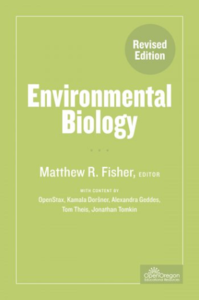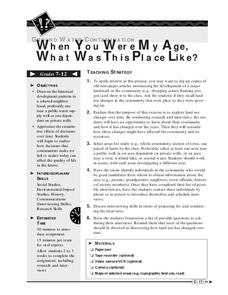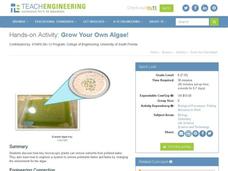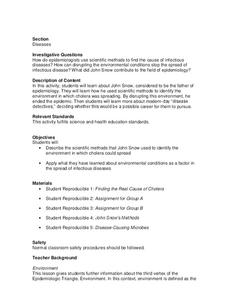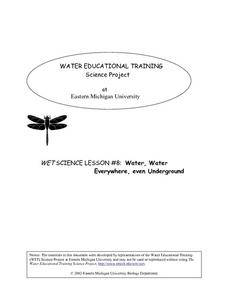National Nanotechnology Infrastructure Network
How Can Nanoparticles Move from Land to Ocean?
Investigate the migration of the nanoparticle from land to water! A lab investigation asks budding scientists to simulate runoff. Testing water samples before and after the simulation leads individuals to make conclusions about pollution...
Curated OER
Ocean Pollution
Students explore ocean pollution. In this ecology lesson, students view a video entitled This Pretty Planet and identify common biodegradable products. Students participate in activities designed to simulate the negative effects of...
Curated OER
Regents High School Examination: Living Environment 2003
The living environment, from the interior of a cell to the complex relationships among populations, are queried in this final examination. Learners look at air pollution maps, diagrams of cells, population graphs, and drawing of cells....
Curated OER
Missing Macroinvertebrates - Stream Side Science
Field study groups collect samples of stream water and identify the macroinvertebrates found. Using their data, they calculate a water quality index to rate the health of the stream. They graph their data and discuss the value of a water...
Curated OER
CO2 and Air Pollution
Seventh graders observe and test for the presence of carbon dioxide gas. They compare concentrations of carbon dioxide gas and conclude high concentrations of carbon dioxide gas are unhealthy for human beings.
Open Oregon Educational Resources
Environmental Biology
Everyone has a responsibility to take care of the environment. Give learners a sense of our environmental concerns with a complete course on environmental biology. The textbook resource includes instruction on topics such as population...
Curated OER
Microscopic Water Life
Students use a light microscope to observe the organisms living in a sample of ocean or fresh water. Students create a drawing of the organisms that they observe. Students then discuss the different body plans of the organisms and the...
Curated OER
Who Dirtied The Water/Clean Water: Is It Drinkable?
Students enter the room, receive a film canister that contains materials that be added to the dirty water bell jar. They record on their data table who or what is doing the adding and the actual substance that has been added to the bell...
Curated OER
Thermal Pollution
In this pollution worksheet, students read about thermal pollution and how hot water affects wildlife. Then students complete 1 short answer question.
Curated OER
Zebra Mussels and Water Pollution
Research the proliferation of zebra mussels and their effects on local bodies of water. The class obtains zebra mussels and examines them, identifying their basic structures. They brainstorm ways the mussel may have been introduced to...
Curated OER
When You Were My Age, What Was This Place Like?
Young scholars discover how land use in their community has changed. In this community and ecology instructional activity, students scan old newspapers to find articles about the development of community land. Young scholars discuss and...
Curated OER
You Are What You Drink!
Students explore water treatment systems. In this water conservation ecology lesson, students identify and explain several processes used for water treatment and define related vocabulary after listening to content information given...
Polar Trec
Why Can’t I Eat This Fish?
Can turning on the television lead to toxins in the food supply? The lesson offers an opportunity for young scientists to complete guided research. A worksheet lists each question as well as the web page necessary to answer the question....
Curated OER
WET Science Lesson #5: Pass the Salt Please! (How Road Salt Affects Wetlands)
As an anticipatory set, biologists listen to the story of Ruth Patrick, a scientist who used algae to detect water quality. They observe a demonstration of osmosis and diffusion. In their lab groups, they place Elodea stalks in...
Curated OER
Water Purification
Students develop an understanding and appreciation of water purification techniques and their implications for health maintenance.
Teach Engineering
Grow Your Own Algae!
Develop a model of a wastewater treatment center. The last activity of the unit has pupils mix a lake water sample into a tank of water containing fertilizers. Over time, the algae from the lake water grows and removes the nutrient-rich...
Centers for Disease Control and Prevention
Diseases
During a cholera outbreak, scientists presented two theories; one theory was based on miasma and the other on germs and contaminated water. The lesson looks at the scientific process for finding the real culprit.
Curated OER
Using Environmental Models to Determine the Effect of Acid Rain on an Ecosystem
Demonstrate to your middle school science learners how chalk breaks down in a weak acid. Discuss what affects acidic rain might have on ecosystems. Lab groups then choose one of two questions: "How does acid precipitation affect an...
Curated OER
Rubber Duckies and Ocean Currents
Students explore marine life by conducting a rubber duck experiment. In this water currents lesson plan, students practice identifying latitude and longitude coordinates on a map and define the currents of major oceans. Students discuss...
Curated OER
Microbes in Long Island Sound
Students discover the harm and benefits of microbes. For this biology lesson, students explore water, nitrogen and carbon cycles. They investigate the factors affecting bacteria growth.
Curated OER
Water, Water Everywhere, Even Underground
The "Engage" section of a wetlands lesson plan asks young ecologists to examine a wetlands poster. You can easily find one online and display it using a projector. Pupils immerse a piece of sandstone and a piece of granite in water to...
Curated OER
Regents High School Exam: Living Environment 2008
Tne New York Regents High School Examinations are comprehensive and include various styles of questions, includingmultiple choice and the analysis of graphs. This particular version, the 2008 Living Environment exam surveys a variety of...
Curated OER
Regents High School Examination: Living Environment 2005
The 2005 version of the Regents High School Examination in the area of ecology is as comprehensive as previous years' exams. It consists of 40 multiple choice questions on everything from the structure of DNA to the interactions within...
Curated OER
Is Your Water Clean?
Students conduct tests of water samples from different sources, such as a local river, tap water, and an irrigation ditch. After determining which pollutants are present in each sample, students hypothesize the possible sources of the...
Other popular searches
- Water Pollution Worksheets
- Water Pollution Experiments
- Air and Water Pollution
- Sources of Water Pollution
- Air Water Pollution
- Water Pollution Lesson Plans
- Water Pollution Activity
- Bacterial Water Pollution
- Water Pollution Works
- Water Pollution Lesson
- Water Pollution Oil Spills
- Types of Water Contamination







